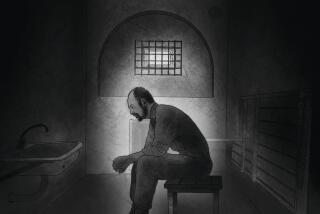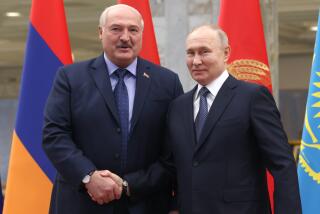Russian ban on U.S. adoptions meant to cast Americans as abusers
Anyone unfamiliar with the hyperbole of post-Cold War politics might be perplexed by Moscow’s move to outlaw American adoption of Russian orphans.
More than 60,000 Russian children once condemned to a hellish institutional life have been brought into U.S. homes over the last two decades, most of them suffering disabilities that would have gone untreated had they been left in the Dickensian orphanages of their homeland. The disabled remain victims of stigma in Russia, while a struggling economy and the Stalin-era brand of orphans being “children of the enemies of the people” continue to dissuade Russians from adopting their own unfortunates.
But Russians’ inability and unwillingness to take care of their legions of unwanted children is nevertheless the source of deep embarrassment and wounded national pride, Russia experts say. And having Americans swooping in and rescuing them by the thousands each year nurtures an inferiority complex that has only deepened since the superpower rivalry purportedly ended with the Soviet Union’s 1991 breakup.
Nationalist lawmakers in the State Duma overwhelmingly approved the U.S. adoption ban last week, and the upper house of the legislature passed it unanimously on Wednesday. President Vladimir Putin signed the law Friday, and it will take effect on New Year’s Day.
Putin’s parliamentary allies pushed through the ban by conjuring up an image of American adoptive parents as sinister hunters of transplant organs, child sex slaves and sacrificial soldiers for foreign aggressions, perhaps even against Russia.
Like most good lies, the sickening picture of American motives painted to get the adoption ban passed was built on a morsel of truth. The measure was named the Dima Yakovlev Act, in memory of the Russian-born toddler who died of heatstroke in 2008 when his American adoptive father left him locked in a car for hours.
Dima was one of 19 Russian-born children to die from accidents or neglect after being brought to the United States over a span of more than 15 years, according to the Moscow-based advocacy group Right of the Child. The agency, which opposed the U.S. adoption ban, reports that at least 1,200 accidental or abuse deaths occurred over that same time among children adopted by Russian families.
Russia has about 740,000 children in state care, UNICEF reports, and the United States is the most frequent destination for foreign adoptions, taking in about 3,000 on average each year. Fewer than 7,000 are adopted by Russian families each year, or less than 1% of those dependent on state care, Right of the Child Director Boris Altshuler has calculated.
The U.S. adoption cutoff is widely seen as retaliation for the Magnitsky Act, a bill President Obama signed into law two weeks ago that sanctions Russian officials for alleged human rights abuses. The bill was named for Sergei Magnitsky, a Russian lawyer who died in a Moscow jail in 2009 after being arrested and beaten for blowing the whistle on $230 million in tax graft by Russian police.
Putin bridles at any U.S. allegation of abuse by Russian officials and believes moves to punish his government are part of an elaborate scheme to undermine and dominate Russia, said Steven Fish, a political science professor and Russian expert at UC Berkeley.
The adoption ban is “an asymmetrical move ... and is very much a product of this prickly wounded nationalism,” Fish said. “These kids are now just going to be caught in a system that already can’t take care of them.”
Adoption has always been a sensitive issue in Russia, he said, because having to depend on American largess to provide adequate care for orphans casts the country and its leadership as “weak and poor.”
Letting a few thousand young Russians leave for new lives with U.S. families each year also plays into the nationalist hysteria over Russia’s demographic crisis, Fish added. He blamed rampant alcoholism for Russian men’s persistently low life expectancy as a far larger contributing factor to the annual population shrinkage of 150,000.
Paul Gregory, a senior fellow at Stanford’s Hoover Institution, said Putin’s followers have churned up public animosity toward U.S. adoptions by resurrecting the Soviet-era propaganda tactic of casting the United States as a dangerous and depraved nation.
“Clearly they want to say that if we’re cracking down on their rights abuses that it’s even worse in the United States. They come up with rather ridiculous cases of cross burnings, and bombings of Jewish synagogues and civil rights abuses to prove that the Magnitsky death in prison was nothing bad at all compared to what goes on here,” Gregory said. “What they fail to mention is that the persecution and prosecution of Magnitsky was done by the Russian government, whereas these unfortunate actions in the United States were done by fringe groups or crazies.”
The Magnitsky Act bars any Russian official associated with the lawyer’s treatment or with other alleged rights abuses from travel to the United States or access to its financial institutions.
The Russian political leadership’s overreaction to the Magnitsky censure, Gregory said, shows that it has yet to overcome its terrible history under the dictatorship of Josef Stalin of mistreating the children of political opponents.
“Putin’s not going to shed a tear over it,” Gregory said of the 1,500 pending U.S. adoptions likely to be blocked by the new law. “He’s going to look at this ban as a weapon in his arsenal of retaliations for the Magnitsky Act, something we can see is really causing those in the leadership some pain.”
ALSO:
Putin inclined to sign U.S. adoptions ban
Attack on Afghanistan police post kills 4
Nelson Mandela home from hospital but still under medical care
A foreign correspondent for 25 years, Carol J. Williams traveled to and reported from more than 80 countries in Europe, Asia, the Middle East and Latin America.
More to Read
Start your day right
Sign up for Essential California for news, features and recommendations from the L.A. Times and beyond in your inbox six days a week.
You may occasionally receive promotional content from the Los Angeles Times.







